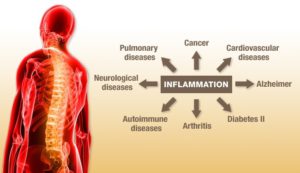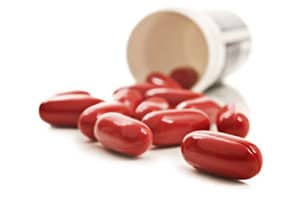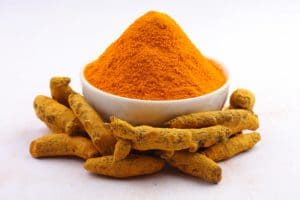Inflammation is often made out to be the bad guy, but it’s actually a crucial part of your body’s immune system response—one you couldn’t live without.
We’ve all experienced inflammation at some point or another. It’s what causes the redness and swelling that appears around a mosquito bite, or the tender, soft skin that appears when you bruise yourself. These common forms of acute inflammation help your body to quickly and effectively deal with injuries and infections.
Chronic Inflammation Starts With Acute Inflammation
Pathogens, including bacteria, viruses, and parasites, are disease-causing agents that can enter your system via natural openings and lesions in the skin. Your immune system is tasked with protecting your body from these foreign invaders.
When you cut yourself, catch a cold, or break a bone, your immune system reacts quickly to eliminate harmful microbes so that you can heal. Symptoms such as heat, redness, pain, tenderness, and swelling appear at the site of the injury or infection. These are signs that your immune system is hard at work.
But this sequence relies on a delicate balance: the moment a foreign invader or injury is detected, chemical messengers attract white blood cells to the site. The white blood cells arrive, along with anti-inflammatory compounds. The anti-inflammatory compounds are like a clean-up crew. After the threat is neutralized, they start the healing process.
That’s acute inflammation. When these symptoms don’t go away, it’s a sign that your immune system’s ON-OFF switch is stuck on ON. Your cells remain ready to fight, though the danger has passed. What was a healthy response leads to chronic inflammation that can ultimately cause more harm than good.

Chronic Inflammation Plays A Role in the Development of a Number of Common Illnesses
Also known as low-grade or systemic inflammation, it’s like your body is on high alert all the time, which uses up your body’s precious resources.
Recent research has shown that chronic inflammation can contribute to the development of diseases such as rheumatoid arthritis, asthma, allergies, ulcerative colitis, arteriosclerosis, Alzheimer’s, Parkinson’s, Crohn’s, and possibly even cancer, among others.
Diet Can Contribute To Chronic Inflammation
What does what you eat have to do with your immune system? You’ve probably heard that certain foods have “anti-inflammatory properties” or “anti-inflammatory effects.” These types of foods include anti-oxidants, and other foods that are high in compounds called polyphenols.
North American diets, which tend to be rich in fat and simple carbohydrates, often lack nutrients to target chronic inflammation. The Mediterranean diet, which touts numerous health benefits, contains a number of these foods.

It includes:
- Fruits. Strawberries, blueberries, oranges, and cherries all have anti-inflammatory properties.
- Leafy green vegetables. Kale, spinach, collard greens, and Swiss chard can help your body to fight inflammation.
- Healthy fats. You should limit saturated and trans fats, which can be found in animal fats, butter, shortening, and margarine. These types of fats can actually aggravate inflammation. Instead, opt for healthy, plant-based fats such as canola and olive oil.
- Omega-3 fatty acids. Oily fish, such as sardines, salmon, mackerel, and herring, contain EPA and DHA—two important types of omega-3s. Walnuts, flaxseed and flaxseed oil, canola oil, almonds, chia seeds, and soybean oil contain another type of health-promoting omega-3 fatty acid called ALA.
- Whole grains. You should try to avoid refined carbohydrates, such as white rice and pasta. Instead, opt for brown rice, whole wheat bread, oats, bulgur, rye, barley, and buckwheat.
- Lean proteins. In the Mediterranean diet, protein is sourced from chicken and turkey, fish and seafood, and plant-based proteins, such as nuts, seeds, and legumes. You should try to limit your consumption of red meat and full-fat dairy products, as they can contribute to chronic inflammation.
- Herbs and spices. It’s easy to overlook the antioxidant and anti-inflammatory effects of herbs and seasoning. But research has shown that ginger, turmeric, cloves, cinnamon, oregano, sage, Jamaican allspice, and marjoram all have anti-inflammatory effects.
- Coffee. Did you know that your morning cup of java has antioxidant and anti-inflammatory properties? Research has shown that coffee is the number one source of antioxidants for those who drink it.
Remember, just as the foods listed above help to reduce inflammation, other foods, when ingested regularly, can trigger inflammation. Fried foods, processed meats, high-fat dairy products, refined carbohydrates, and pop all make the list.

Not surprisingly, your lifestyle choices also play a role in activating your immune system. Cigarettes contain a number of toxins which have been shown to contribute to long-term inflammation in the body. Alcohol has a similar effect. Finally, inactivity and obesity can make it more difficult for your immune system to function properly.
Anti-Inflammatory Drugs May Cause Side Effects
When inflammation-related pain strikes, most of us turn to over-the-counter anti-inflammatory drugs, such as ibuprofen (Advil ®, Motrin ®) and naproxen (Aleve ®). Though they may help to alleviate pain for a while, they can trigger side effects. Long-term use of the non-steroidal anti-inflammatory drugs (NSAIDs) listed above, for instance, can cause stomach ulcers.

For more severe pain caused by chronic inflammation, others are forced to turn to prescription drugs, such as oral corticosteroids. Corticosteroids mimic the role of cortisone, an inflammation-suppressing hormone that is found naturally in the body. But meds such as cortisone, prednisone, and hydrocortisone come with serious risks. Potential side effects include fluid retention, high blood pressure, mood swings, memory problems, weight gain, and glaucoma.
Targeting Inflammation With Natural Remedies
With increased awareness of these effects, more and more people are turning to natural anti-inflammatory substances, many of which have been used for centuries and have fewer side effects than NSAIDs or prescription corticosteroids. It’s important to note, though, that “natural” doesn’t mean that these substances won’t interact with medication you’re already taking or cause side effects of their own. You should always consult a health care professional, such as a pharmacist or family doctor, before taking natural or herbal remedies and supplements.
Keeping that in mind, the following natural remedies may help to relieve symptoms of chronic inflammation:
- Fish oil supplements. Fish oils are high in the omega-3 fatty acids DHA and EFA. Research has shown that taking fish oil on a daily basis can help to improve pain and aching joints. For many, it may be a healthier option than eating fish, as some varieties contain high levels of mercury. This study even found that taking 1200 mg of fish oil for a two and a half-month period was as effective at relieving neck and back pain as taking over-the-counter NSAIDs.

- Turmeric. Turmeric is used to flavour curries and comes from the same family as ginger. Its active ingredient is curcumin. Various studies have shown that turmeric may be effective in treating pain and inflammation related to conditions such as osteoarthritis.
Other natural remedies may include:
- White willow bark
- Green tea
- Maritime pine bark (pycnogenol)
- Frankincense (Boswelia serrate resin)
- Resveratrol
- Cat’s claw (uncaria tomentosa)
- Capsaicin (chili pepper)
This page is also available in:
![]() Français
Français


